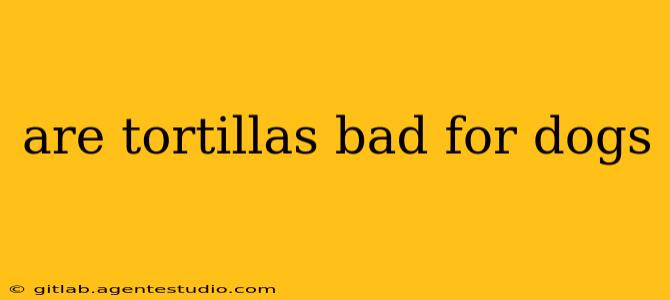Tortillas, a staple in many cuisines, are often a source of delicious debate – especially when it comes to sharing with our furry friends. Are tortillas bad for dogs? The short answer is: it depends. While a small, occasional bite of tortilla likely won't harm your dog, regular consumption or large portions can pose several health risks. Let's delve into the details, separating fact from fiction and providing you with the information you need to make informed choices about your dog's diet.
Understanding the Tortilla Dilemma: Corn vs. Flour
The type of tortilla significantly impacts its suitability for canine consumption. Both corn and flour tortillas present different challenges:
Corn Tortillas: The Relatively Safer Option
Corn tortillas are generally considered the slightly better choice compared to flour tortillas. They're typically lower in fat and contain more fiber. However, they still aren't ideal for regular inclusion in your dog's diet. Here's why:
- High Carbohydrate Content: Dogs don't require a high-carbohydrate diet. Excess carbohydrates can lead to weight gain, obesity, and related health problems like diabetes.
- Potential for Digestive Upset: Even though corn is relatively digestible for dogs, large quantities can cause diarrhea or vomiting. Introduce corn tortillas in moderation, if at all.
- Allergic Reactions: Although less common than wheat allergies, some dogs may be allergic to corn. Monitor your dog closely for any signs of an allergic reaction such as itching, swelling, or digestive distress.
Flour Tortillas: A Big No-No
Flour tortillas present a more significant risk to your canine companion. Here's why they should be avoided:
- High Fat Content: Flour tortillas are often higher in fat than corn tortillas, contributing to weight gain and potential pancreatitis. Pancreatitis is a serious and potentially life-threatening inflammation of the pancreas.
- Wheat Allergy Risk: Many flour tortillas contain wheat, a common allergen in dogs. Wheat allergies can manifest in various ways, from skin problems to digestive issues.
- Added Ingredients: Many commercially produced flour tortillas contain added sugars, salts, and preservatives, none of which are beneficial for your dog's health.
What to Do if Your Dog Eats a Tortilla
If your dog has accidentally eaten a small piece of tortilla, it's likely not cause for immediate alarm. However, monitor them closely for any signs of digestive upset, such as vomiting, diarrhea, or changes in appetite.
If your dog has consumed a large quantity of tortillas, particularly flour tortillas, or shows signs of distress, contact your veterinarian immediately.
Healthy Alternatives to Tortillas for Dogs
Instead of offering your dog tortillas, consider healthier and more appropriate treats. Some excellent options include:
- Plain, cooked chicken or beef: A small amount of lean protein provides valuable nutrients.
- Carrots or green beans: These crunchy vegetables offer fiber and are low in calories.
- Dog-specific treats: Choose commercially available treats formulated to meet your dog's nutritional needs. Always check the ingredients list and avoid those with excessive sugar, salt, or artificial additives.
Ultimately, a balanced, dog-food-based diet is best for your canine companion. Treats, including tortillas, should be given sparingly, if at all. Consult with your veterinarian for personalized dietary advice tailored to your dog's breed, age, and health status. They can help you navigate the complexities of canine nutrition and ensure your furry friend thrives.

